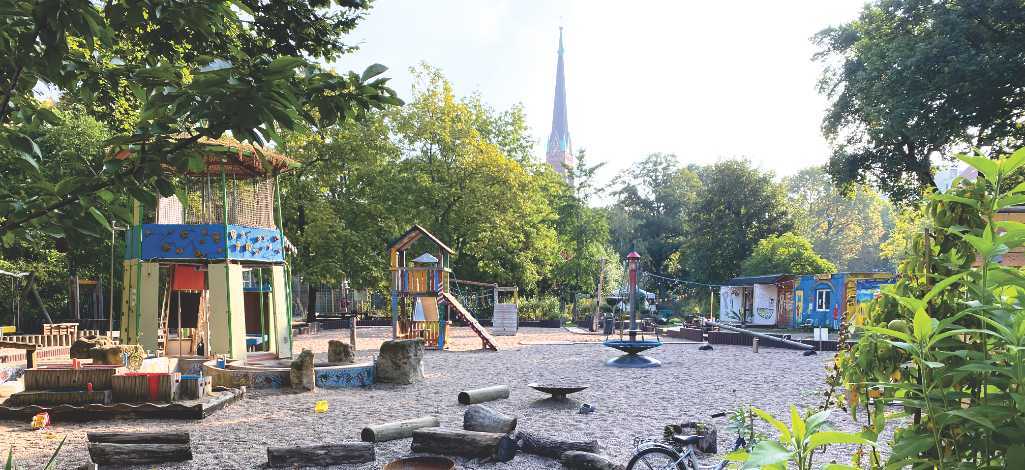Environmental Education & Wilderness Tracking
Environmental education refers to educational activities and processes that aim to promote understanding of the environment, identify environmental problems, and develop solutions. The main goal of environmental education is to empower people to make informed decisions that lead to better environmental protection and a more sustainable future. It can be integrated into various age groups and educational levels. The focus of our foundation in the area of environmental education is centered on work with children and adolescents, as their willingness to learn and develop is still strong. This is particularly true for urban children, who often have a deficit in nature exposure. In collaboration with wilderness educators, an educational concept for school children has been developed, which is now being used in several primary schools in Berlin: wilderness tracking.
Wilderness tracking helps to ensure that children who have been socialised in urban areas are not disconnected from nature. The outdoor experience has an immediate positive social impact on the children. In the medium term, the project will also benefit both flora and fauna. The constant availability of social media such as Facebook, Instagram, YouTube and TikTok on smartphones has a significant impact on the development of children and teenagers and is an absolutely dominant factor in everyday life. More and more children are neglecting outdoor activities and physical exercise. This diminishes the appreciation of nature and children do not understand the consequences of disposing of their rubbish in nature, for example.
The increasing littering of urban green spaces and even wooded areas is generally a widespread and big problem. Every day, to-go boxes, pizza boxes and coffee cups pile up on park benches; plastic bags get caught in trees and bushes; and thousands of cigarette butts line the paths. There are also drinks cans and lots of other small pieces of waste. Clean-up and rubbish collection campaigns are a great initiative, but the problem must be tackled at its roots. Children and young people should be introduced to nature and motivated to treat it responsibly. Advancing digitalisation and the overwhelming power of smartphones are distancing people from the natural foundations of life. Constantly being online, playing mobile phone games and the fear of missing out (FOMO) are detrimental to mental and physical health, especially in childhood and teenage years when people are developing social skills. That’s why we bring children and young people together with nature.
With wilderness tracking, we enable schoolchildren to go on regular trips into the countryside under the supervision of certified wilderness mentors. This allows them to experience the differences between the seasons at first hand, gain outdoor experiences and knowledge about nature through play. The excursions take place on a monthly basis and become engrained in the children’s minds due to their regularity. This strengthens the children’s understanding and appreciation of nature and their health.
Through personal experiences in the green spaces, children are sensitized to treat nature with goodwill and respect. This addresses the danger of littering and destruction of nature at its root. Especially in Berlin’s hotspot districts, there are many children, often from large families with low incomes and low educational levels, who rarely have the opportunity to spend time in nature. Here, the impact of the project is particularly important.
The foundation also provides the children with a wilderness diary. There, they can record their individual impressions and later share them with their classmates and families. This allows more people to learn about the important contents of wilderness tracking beyond the project boundaries.
Positive effects of stays in forests and nature:
- Experiencing the four seasons
- Care and attention for the children
- Playful acquisition of knowledge
- Slowing down of everyday life
- Reduced production of stress hormones
- Lowering of heart rate and blood pressure
- General strengthening of the immune system
- Health for the respiratory tract (forest walks)
- Strengthening of the metabolism
Excerpts of some program contents and games:
- Hide and seek, stealth training, and mindfulness exercises
- Climbing games, catching games
- Tracking animal trails
- Exploring bird calls and types of trees
- Group exercises and trust games with blindfolds
- Sitting circle and reflection round
- “Look-Closely” path (children must discover things on the ground, in bushes, or in trees)
- Explorations with binoculars
- Creative games (e.g., sitting circle with introduction round and an animal matching the initial letter like “Anna” and “Ant”)
Fact check:
- Target group: All grade levels
- Time frame: 8–10 appointments per year (depending on the year and holiday schedule)
- Duration per appointment: about 3 hours (excluding travel time)
- Supervision: 1-2 wilderness mentors and at least one supervisor from the school
As a foundation, we are convinced that experiencing nature and spending time outdoors is essential. On the one hand, it promotes children’s mental and physical health, and on the other, an increased connection to nature leads to mindful and careful behaviour towards our environment.



